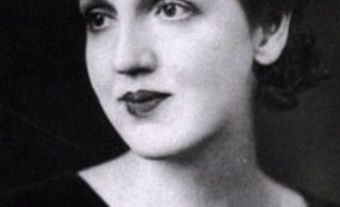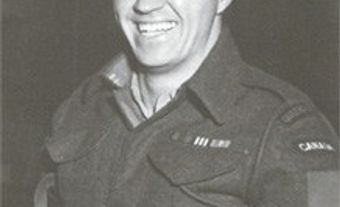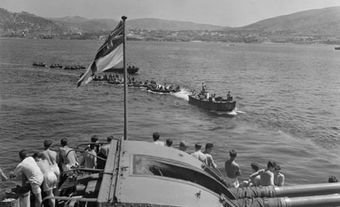This article was originally published in Maclean’s magazine on October 13, 2003. Partner content is not updated.
DON'T EXPECT MUCH sympathy from Sgt. Paul Coppicus. For the rugged soldier from Moosomin, Sask., tackling challenges on your own initiative is the only way to prove your worth.Canadian Soldiers in Afghanistan
Hunting Death in the Sand: Sgt. Paul Coppicus
DON'T EXPECT MUCH sympathy from Sgt. Paul Coppicus. For the rugged soldier from Moosomin, Sask., tackling challenges on your own initiative is the only way to prove your worth. "When someone comes up to me," says the 37-year-old with barely a twitch of his twirled mustache, "and claims, 'I have a problem dealing with this,' my gut reaction is - so what?"
For a military engineer whose job includes removing LAND MINES - he spent six months in Bosnia in 1996, doing just that - toughness is not a bad character trait. Last week, he was called on to lead a team to the site of the mine blast that killed two Canadians. As that tragedy underscored, Afghanistan is one of the world's most heavily mined countries. Over the last year, thousands of mines have been removed, but they're still being found in areas designated as safe, while new ones are being deployed by the remnants of the Taliban and al-Qaeda. In spite of the danger, Coppicus recalls, "The first time going into a minefield in Bosnia was exhilarating. The adrenalin was flowing and I was too nervous to look anywhere other than right in front of me."
Currently, he also has to contend with the group of young engineers under his command who, suddenly, fully understand the risks confronting them. It's all a long way from Moosomin, which Coppicus describes as a "typical Norman Rockwell small town." There, he dreamed of joining the army and, attracted by the adventure and camaraderie depicted in war movies, he signed on in 1984. Since then, he's been to Cyprus and Kosovo as well as Bosnia. But times have changed, he says, at least as far as camaraderie is concerned: "There's a lot of individualism with the younger soldiers. Everyone has a TV and Nintendo at our base in Canada. When I joined you'd be down at the mess watching the big screen or playing pool. You were together."
Coppicus's children, son Alex, 7, and daughter Raina, 5, are never far from his mind. "You miss a lot," he says wistfully. "The first time they walk, the first time they speak. When Alex was four, I was away for six months. When I came back, Alex folded his arms and walked away. He wouldn't talk to me for a day and a half." Coppicus has now made two promises: "To my kids, I'd like to say this is Daddy's last attempt to make things better in the world. To my wife, Tina, I repeat, this is my last attempt at helping make things better."
Putting a Female Face on the Military: Master Cpl. Renee Russell
BLOND, AND BABY-FACED - it's easy to see Master Cpl. Renee Russell as vulnerable, someone who should be safely home, not toting an automatic rifle around Kabul. But don't be mistaken. The 21-year-old reservist from Barrie, Ont., counts G.I. Jane, a movie about a female soldier trying to find her way in the male-dominated military, among her favourite films. Sgt. Mark Miller has seen her tough side. "Renee's not a dress-up kind of girl," he says. "She'd rather play football with the boys than put on a dress. She can handle herself." In fact, laughs Russell, "I don't even own a dress."
Russell, one of 50 reservists in Afghanistan with the Canadian troops, is part of a Civil Military Co-operation unit that is assisting in the reconstruction of the war-ravaged country. "Our basic task," she explains, "is to help the Afghan people help themselves by organizing rebuilding projects." So far, her unit has rebuilt schools and bridges, and dug wells. By working closely with the community, Russell's group also hopes to create an atmosphere of goodwill. "We've already had some success," she says. "We were approached by children who kept saying, 'Mine, mine.' So we followed them and they brought us to an unexploded ordnance. That sort of thing is exactly what we want."
Most Afghans have never seen a female soldier; some of the men have been so taken by her that they have proposed. "I was standing guard when a van drove by filled with men," Russell recalls. "It stopped and 12 guys poured out. One that spoke English started asking me, 'Do you have a family? Do you have brothers?' And then, of course, 'Are you married?' I said no and right away he asked me to marry him."
Putting a female face on the military can sometimes help in the work the Canadian troops are doing. In a suburb of Kabul, Russell displays her skills when an old woman hesitantly peers from her crumbling house at a menacing group of soldiers. It's Russell who approaches, gently coaxing her out. Some questions are resolved about the state of the village's water supply and its mosque - another rebuilding project. "We have to be careful about giving these people false hopes," says Russell afterwards. "It doesn't help us if we come here and then nothing happens." That's a heavy responsibility for soldiers such as Russell - and for the governments they represent.
Cruising Kabul's Dangerous Streets: Cpl. Allan Spencer
ON HIS FIRST day at work in Kabul, Cpl. Allan Spencer, 29, saw an old man die - clipped by a speeding car while riding his bicycle. Since then, as an official driver at Camp Julien, he has seen more than his share of Kabul's wild streets. "I've already done about 5,000 km in this city," he says, steering his SUV, with the Canadian flag fluttering from the antenna, through a tangle of cars, bicycles, pedestrians and donkey carts. "I really don't need a map any more. Just tell me where you want to go - I'll get you there."
Spencer hails from Broughton, a village of about 26 people on Cape Breton Island, where his father worked as a coal miner. He's been driving since he was 13 and loves hot rods, so wheeling around Kabul has been interesting - even fun. "There's a system to driving here," explains Spencer, without taking his eyes off the traffic. "You just have to get to know it." Five years as a member of a reconnaissance platoon has helped; landmarks and obstacles are filed away in his encyclopedic mind. "I watch for places that could be used to launch an attack," he says. "Fortunately, I have the city pretty much mapped so I know instantly whether or not I'm in a dangerous position."
Spencer, who joined the Forces in 1990, has found Afghanistan to be in worse shape than other countries he's been posted to. "When I describe Kabul to my parents," he says, "I refer them to some of the photographs I've taken on previous tours and tell them to imagine that scale of destruction - but magnified a hundredfold." It's not only architectural devastation: the victims of war are everywhere. "There's this one young girl who can't be more than 12 who had her legs blown off by a land mine," Spencer says. "She panhandles, using her hands to get around."
He points out people he sees regularly on his rounds. A pair of women in burkas who, seated on rocks in the middle of what the Canadians call Burka Bump Road, beg for money. A traffic cop in front of the Afghan Wireless Communications Company. "Did you ever see the movie Bad Lieutenant?" Spencer asks. "Well, he's just like that. I watched him pull a guy out of a cab and start giving it to him." But the corporal is always looking beyond the characters in the crowd for terrorists. How observant is he? "Remember when we turned onto Burka Bump Road?" Spencer asks. "There was a bus in front of us, a taxi and a guy on a bike. The taxi's windshield was cracked on the top left, the bus had 'Millie' written on its back and the bicycle was green." In Kabul, being aware of every detail just may help keep Spencer and his passengers alive.
Practising Medicine on the Front Line: Master Cpl. Mario Charette
WORKING AT HIS COMPUTER in Camp Julien's medical facilities, Master Cpl. Mario Charette doesn't stand out. But this unassuming operating room technician is a decorated veteran of four previous postings, including the Gulf War and Somalia in 1992-93, where he was caught in a riot at a hospital in Belet Huen. In the ensuing chaos, bystanders were hit by gunfire - and Charette jumped in to help. "I was a junior medic at that time and helped provide triage for the wounded outside the hospital," he recalls. "The whole event must have lasted something like three or four hours, but it seemed like just five minutes to me."
Charette, 36, who was awarded a medal for bravery for his heroism during the riot, found himself on the front lines again last week when two Canadian soldiers died in a land-mine explosion, and three others were injured. "Knowing it was a mine, I was preparing for more than one casualty," he told Maclean's shortly after helping care for the victims. "We've had a lot of exercises preparing for this type of eventuality but this wasn't an exercise. There were a lot of very serious faces."
Before that, Charette's stay in Kabul had been relatively peaceful. He kept busy by maintaining equipment and helping with French-language classes. His participation in the camp's Terry Fox Run is legendary: four 10-km runs were held in 35º C heat on a course littered with loose rocks - and Charette ran them all. But with injured soldiers arriving, the real reason for his presence in Kabul was driven home. "Having been exposed to various traumatic scenarios prepared me for what just happened," he said. Fortunately only one of the injured men, who suffered second-degree burns to his hands, required surgery.
Over the past 15 years, almost every aspect of Charette's life has been connected to the Forces. "My wife, Geneviève, proposed to me in a letter when I was in Somalia," he recalled. "We got married when I came home." He'd hoped his daughter, Naomi-Nisha, now 8, would be born during a leave from Croatia, but the clock ran out. "On the flight back to Croatia the captain patched a radio line through so I ended up sitting in the cockpit talking to my wife," he recalls. "Three days later she gave birth." Last week, with casualties casting a grim mood over Camp Julien, Charette was definitely in the right place at the right time. Once the emergency had been tended to, he was relieved. "All the preparation my team has done definitely paid off," he said. "We came together in a stressful situation and proved that we can get the work done."
On Guard against an Unseen Foe: Lieut. Chris Nobrega
WHILE STUDYING at the Royal Military College in Kingston, Ont., Lieut. Chris Nobrega wrote a paper on the Soviet invasion of Afghanistan. Now, like so many foreign soldiers before him, he has faced danger in the desert as he led a rapid-reaction team to the site of last week's explosion that killed two Canadians. "When we came onto the scene we realized it was one of our units that was involved," the youthful looking 34-year-old Torontonian told Maclean's. "We had to extract the unit that was involved in the mine strike."
Well aware of the risks entailed in his assignment to Afghanistan, Nobrega had practised repeatedly how to react to this type of incident. "Everyone knew what they had to do when they got out into the scene," he said, "and it was just a matter of trying to gain control of the situation as it unfolded." With the realization that two of their colleagues were dead, their determination to proceed with the mission only stiffened. "This event solidifies my resolve to be out here and to accomplish the task that we've been assigned," he said. "It's a greater justification, a more personal justification."
In addition to being prepared to engage the enemy while he's on patrol, Nobrega has to undertake community diplomacy - a role he relishes. "It's important for us to keep a close tie with the local population," he'd told Maclean's as he dropped by a police station a few days before the attack. With his troops standing watch outside, he and police chief Ali Jan drank tea and discussed Canada's role in the city. "We are very happy you are here," said Ali. "This is Afghanistan's last chance. If we miss it, our country will be destroyed." Nobrega nodded in agreement: "That's what we're here to prevent."
Understanding a foreign culture comes easily to Nobrega, who immigrated to Toronto with his Guyanese parents when he was six. He quickly adapted, and was soon playing pickup hockey at a rink in the city's west end. At the age of 12 he joined the cadets and has been involved with the military ever since. Nobrega takes great joy in meeting people, especially kids. "They're the same wherever you go," he said, stepping from his vehicle. A crowd of children swarmed around him. "When they see a guy in uniform, they always rush over and try to talk to you, try to take your hand," said Nobrega with a mischievous smile. "Who here can tell me where I'm from?" he asked. "Canada," the children replied in unison. "How far is Canada from here?" he asked. "Far," they shouted back. Last week, to the troops, Canada seemed very far away.
Maclean's October 13, 2003

 Share on Facebook
Share on Facebook Share on X
Share on X Share by Email
Share by Email Share on Google Classroom
Share on Google Classroom


